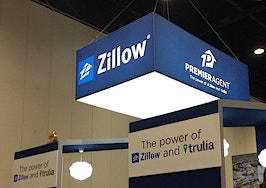A company called Corus Realty Holdings has filed a federal lawsuit against Zillow Group and two of its subsidiaries, Zillow and Trulia, alleging patent infringement.
The June 11 complaint alleges the Zillow and Trulia mobile listing search apps violate Corus’s 2001 patent, called “Real-estate information search and retrieval system.”
Corus Realty Holdings held a real estate brokerage license in Virginia until it expired in 2009. That year, real estate brokerage Long & Foster acquired Corus. Long & Foster does not own the patent at issue in this lawsuit, does not know who does and is not involved in these legal proceedings, a Long & Foster spokesperson told Inman today.
The patent appears to chronicle features common in virtually all listing search apps today, including “a data terminal which displays icons representing properties in a given real-estate market on a digital map. The icons are selectable so that, when selected, information derived from an MLS or other database are displayed in association with the map.”
The patent goes on to detail how the terminal would use GPS and a “data-enabled mobile phone” to receive location data and display an icon representing the terminal’s current location on a map. Through the phone, the terminal could also link to a property information database and display that information, including visual media, when a property icon is selected on the map.

Image included in Corus Realty Holdings’ patent
“The invention described and claimed in the ’803 patent is a tangible and unconventional improvement of the technology and methods available to real estate agents before 2001,” the complaint says.
“The inventors sought to improve existing computer technology used by real estate agents (e.g., MLS databases) by integrating it with methods of locating a user and properties on a digital map. The integral combination of technology such as MLS databases, mobile devices, digital maps and location information allowed users to provide information to clients in real time and more effectively provide their services.”
According to the complaint, “The Zillow Accused Product causes a property icon to be displayed on the mobile phone display screen at the location on the map of the property. Upon selection of a property icon by a user, the Zillow Accused Product will display property information such as price and status from MLS data that is associated with the property selected.” The complaint describes the Trulia app similarly.
Both apps have existed for nearly a decade. Trulia launched its first mobile search app in 2008 and Zillow followed in 2009.
In an emailed statement, a Zillow spokesperson said, “We are aware of the lawsuit recently filed. While we won’t discuss pending litigation, we believe the claims are without merit and intend to vigorously defend ourselves against the lawsuit.”
The address listed for Corus in the complaint, 1900 North Taylor Street, Arlington, Virginia, 22207, appears to be a single-family residence.
Michael Gorman, now managing director of the Corus Group of Long & Foster, is listed as an inventor on the patent and was formerly founder and CEO of Corus Realty Holdings. Gorman did not respond to multiple emails and phone calls requesting comment. Corus Realty Holdings’ attorney, Dario Machleidt of Kilpatrick, Townsend & Stockton LLP, also did not respond to email and phone requests for comment.













